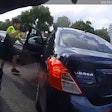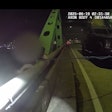The United States has the only border in the world where a first-world industrial economic power abuts the third world. If you want to see what that looks like, then drive through El Paso and look over the Rio Grande at Juarez.
When you focus your eyes on the yellow hills of Juarez, walk its dusty streets, and breathe its filthy air, then it's easy to understand why people will risk everything to come across the border to the "Promised Land." Anyone living in that grinding poverty would try to make that trip north. Any person lucky enough to win the birth lottery and be born in the good old U.S. of A who doesn't believe that if they were born a Mexican peasant that they would for one minute respect American immigration law is living in the greatest fantasy world this side of Oz.
Poverty sucks. Hunger is a great motivator. When you put yourself in the shoes of a weary campesino on the other side of the river of dreams, then you gain a grasp of the sheer human desperation that drives him to climb a fence, swim a river, or pay his life's savings to a coyote to relocate his body a few minutes of latitude and 100 years of industrial progress to the north.
But that campesino, or brick layer, or nanny is indeed breaking American law. And the question is, what is the United States willing to do about it? And should it do anything?
All Americans must wrestle with the issue of opening or closing the borders, weigh the cost and benefits of illegal aliens on our economy, and consider the security threat presented by the millions of undocumented people in our midst. But we are a nation of immigrants-both legal and illegal-and many of us sympathize with the plight of the undocumented.
We are frankly confused and torn on this issue. And that confusion is reflected in how American law enforcement is asked to approach people who break our immigration laws.
Law enforcement is being told to look the other way when it comes to illegal aliens. Consider the following:
- In August, the U.S. Border Patrol was officially reprimanded for detaining Mexican illegals outside of the Mexican consulate in San Diego. This led to an edict-later reversed-that prohibited Border Patrol agents from making arrests anywhere except at the border or at designated highway checkpoints.
- Also, in August, the embattled governor of California signed a bill that allows undocumented people to acquire official and legal California driver licenses.
- And in September, a group of immigration activists loaded up a bus full of citizens, legal residents, and illegal aliens and drove it from Los Angeles to New York on what they called a "Freedom Ride" to gain rights for illegals. Border Patrol agents stopped the bus near El Paso at a highway checkpoint. After questioning, the legal and illegal passengers were allowed to pass. And you can bet that the agents who stopped that bus caught hell for it.
All of these examples go to prove two things: Border Patrol agents have a really tough job, and nobody in this country has any clue regarding what to do about illegal immigration.
The realities of coping with millions of illegal aliens within our borders traps American law enforcement in a paradox. It's illegal for these people to be in the country. Therefore they should be detained and deported. It's illegal to hire these people. Therefore the businesses and individuals that hire them should be prosecuted.
But there's no national will to crack down on these lawbreakers. And illegal aliens have come to be accepted as an essential element in the American economy. So instead of enforcing immigration law, police agencies are working to educate illegals about American laws, to assure them that by reporting crimes they will not be deported, and to build rapport between officers and undocumented aliens living in their jurisdictions.
There are no easy solutions to this issue. But it is a pressing concern for law enforcement. So we ask, what would you do about it? What is your experience on the streets working with illegal aliens? Go to the forums at Policemag.com or write us and give us your two cents.


















